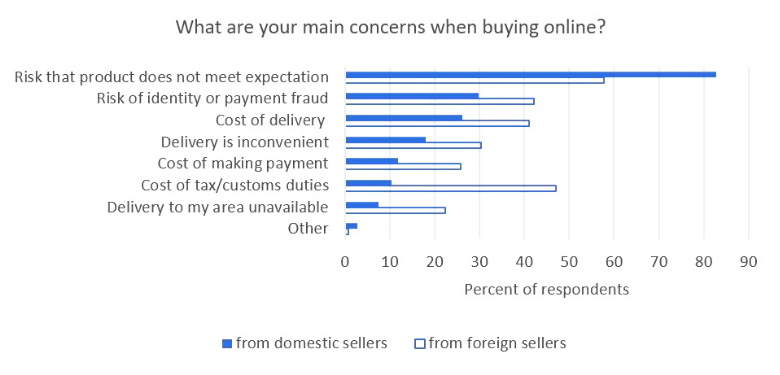 Omni channel technology of online retail business.
Omni channel technology of online retail business.
Digital trade is a powerful economic development opportunity for Albania. Online sales channels can help Albanian businesses reach more customers, at home and abroad. Remote digital job opportunities can allow more Albanians to join the global labor market, while staying in their communities instead of emigrating. Albanian customers can gain by using online shopping for convenient access to a greater variety of products and services than available in local physical stores.
Recent trends show that digital trade is already growing rapidly in Albania: 18.1% of Albanian firms reported having started or increased online business activity during the pandemic. But Albania still lags its peers along key dimensions. For instance, only 38.4% of Albanian consumers are estimated to use e-commerce as of 2022, far below regional peers such as Croatia (61.8%).
Strengthening the enabling environment for e-commerce
As a starting point for this collaboration, the World Bank has conducted a comprehensive e-commerce diagnostic, reviewing Albania’s existing digital trade ecosystem. This has identified key constraints regarding digital connectivity, online payments, logistics and customs, digital capabilities of firms, workers and consumers, taxation as well as the regulatory environment for e-commerce. For instance, the diagnostic conducted a survey of Albanian online consumers and found that lack of trust in local online sellers remains a core challenge for growing Albanian e-commerce.
Lack of trust in Albanian online sellers remains a key constraint for growth of e-commerce

Since the diagnostic was published in 2020, Albania has started acting on key recommendations. To boost trust in e-commerce and protect consumers, the Government has clarified what information online retailers need to provide to their customers and has set up a task force to assess compliance with these requirements. The business community has formed the Albanian E-Commerce Association (AECA), which advocates for the sector’s interests and helps its members establish high-quality webstores. The Albania Post has started marketing dedicated e-commerce services to help more businesses launch online sales, while the gradual implementation of key legislation is facilitating electronic payments. The government has legislated the regular transparent publication of tariffs by all logistics providers in order to increase competition and lower the cost of cross-border parcel delivery.
Encouraging investment in digital skills
To take advantage of the digital trade opportunity, Albanian workers need more than just the right enabling environment. They need the right skills. Disadvantaged segments of the labor force in particular risk falling behind – and may need more active support. To follow up on the e-commerce diagnostic, the World Bank and the Government have therefore launched the Digital Jobs Albania initiative.
This project partners with a private sector consortium, Learnio and EuroPartners Development, and pilots a three-month online training program in web development, graphic design, and digital marketing to help Albanian women work on online international freelancing websites. The aim is to encourage more Albanians to consider digital jobs and to inspire future digital skills training programs. The focus on women helps bridge gender gaps in access to digital careers.
While still ongoing, the training program has already yielded results. More than 5,000 Albanian women expressed interest in participating, far exceeding the available spots and demonstrating the significant unmet demand for such trainings in the country. More than 500 students have been enrolled through the Digital Jobs Albania program. Some testimonials from students enrolled in the program are already available here.
Nudging businesses to explore online sales channels
In 2021, only 13.3% of Albanian businesses reported e-commerce sales. Yet, online sales channels can be a cost-effective tool to bridge physical distance to clients. Online ratings and testimonials, as well as digital advertising, can help convince new customers to try products. And by offering a more convenient shopping experience, businesses can use e-commerce to gain a comparative advantage in the marketplace.
To nudge more Albanian entrepreneurs to experiment with online sales channels, the Albania Investment Development Agency (AIDA) is cooperating with the World Bank through a series of outreach initiatives. In a first step, AIDA has recently published an Albanian e-commerce guide, which serves as an accessible local language resource for businesses. The guide helps entrepreneurs to weigh the benefits and costs of establishing an online sales channel, highlights existing business success stories, and provides practical advice on how to get started with e-commerce.
Seizing the Digital Trade Opportunity
Private sector initiative – by businesses, workers and households – lies at the heart of seizing the digital trade opportunity. But Albania is already offering valuable insights on what governments and international partners can do to help the process: start by strengthening the enabling environment for digital trade, encouraging investment in digital skills and nudging businesses to go online.




Join the Conversation